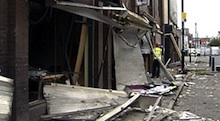
A bomb attack on a PSNI base and the attempted assassination of a senior British Army officer have rocked the political system in the North of Ireland.
Both attacks within 48 hours were claimed by the organisation using the name Oglaigh na hEireann -- in English, the Irish Republican Army.
The levels of intelligence known to the group has caused some alarm to the British and Six-County authorities.
The PSNI said the unnamed British Army Major -- believed to be on his way to work at the time of the attack -- was “lucky to be alive” after a booby-trap device planted under his car failed to detonate.
It was reported the device was spotted lying on the driveway of his home in Bangor, County Down as he prepared to drive to work.
The PSNI said the bomb, which contained high-powered Semtex explosive, was viable and capable of causing “catastrophic” death and injury.
The attack followed a car bomb attack which devastated the main PSNI barracks in Derry city centre in the early hours of Tuesday.
No one was injured in that attack, which is said to have contained 250 pounds of explosive. However, the PSNI’s delay in warning the public about the bomb has increased concerns over the possibility of casualties in the current armed campaign. Only after fifteen minutes was an announcement made, endangering civilians who were left with minutes to spare to clear the area.
The bomb was in a taxi which had been hijacked half an hour before the explosion at Cooke Street in the Long Tower area of the city about one mile from the PSNI base. It was also reported to have used relatively advanced anti-handling systems to prevent it being defused.
A caller to the BBC claimed responsibility for the Derry attack in the name of Oglaigh na hEireann, but made no coherent statement.
Sinn Fein’s Martin McGuinness, the Deputy First Minister, said the group which planted the bomb was an “embarrassment” to the people of Derry.
“If they think they will destroy the political institutions the people of Ireland voted for; if they think they’re going to destroy the working relationship I have with Peter Robinson; if they think they will undermine the peace process, they are living in cloud cuckoo land.”
SDLP justice spokesman Alban Maginness said the Bangor attack suggested a high level of intelligence was now in the hands of ‘Oglaigh na hEireann’.
“There should be a full and frank statement from the PSNI indicating who is responsible for this attack that informs on the nature and capacity of the explosive device, on how sophisticated it was.”
There was also a hoax attack on New Barnsley PSNI base in west Belfast on Wednesday night, while fireworks were hurled at the Brownlow base in Craigavon on Monday night.
Ulster Unionist Assembly member Leslie Cree said the attacks “confirm fears of a surge in dissident activity”, while DUP policing board member Peter Weir said those involved were “crazed fanatics” who “must be crushed”.
Speaking on radio today [Thursday] in response to the escalated level of conflict, Sinn Fein President Gerry Adams said that his party had invited representatives of a number of ‘dissident’ groups offering talks. However, only the 32 County Sovereignty Movement had so far responded.
“The fact is that there is now no place on this island for political violence. There is a peaceful and democratic way for serious people who want to see a united Ireland,” he told the BBC.
“There is a peaceful strategy and people can disagree until the cows come home about elements of it but there is no space for these incidents or for any armed actions of any kind.”
He said none of the armed groups who had launched attacks this week was prepared to put forward representatives to explain their position.
“Only the 32 County Sovereignty Movement has written back to say they would be prepared to meet and Gerry Kelly is going to head up a delegation after the summer to do that meeting.”
The West Belfast MP also claimed that some of the active republican groups were “definitely infiltrated by British security agents” anxious to disrupt the political process.
He said he was not suggesting there was a conspiracy at the top of the British military, but said that for some within the security system “the war isn’t over”.
“It is clear that the people involved in [violence] are more anti-Sinn Fein than anti anything else. They don’t have a strategy, they don’t have anyone prepared to articulate it. Who is out there defending these actions?”
Pointing to Republican Sinn Fein he said: “Let’s hear them defending their position. The 32 County Sovereignty Movement is there, let’s hear them defending the position. Eirigi is there, let’s hear them defending the position. If they are genuine about what they are at, then they should be articulating and scrutinised.”
![[Irish Republican News]](https://republican-news.org/graphics/title_gifs/rn.gif)
![[Irish Republican News]](https://republican-news.org/graphics/title_gifs/harp.gif)

